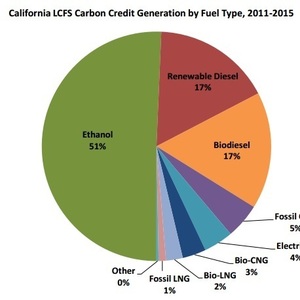RFA publishes analysis of California LCFS data

Renewable Fuels Association
April 28, 2016
BY Erin Krueger
The Renewable Fuels Association has released an analysis of recently published data on California’s Low Carbon Fuel Standard, noting grain-based ethanol provided nearly half of the greenhouse gas (GHG) reductions achieved under the first five years of the program.
The California Air Resources Board published updated quarterly LCFS data on April 15 that spans through the fourth quarter of 2015. It includes LCFS credit data related to biobased compressed natural gas (bio-CNG), biodiesel, CARBOB, biobased liquefied natural gas (bio-LNG), diesel, electricity, ethanol, hydrogen, liquefied natural gas (LNG) and renewable diesel. It also includes data related to feedstock.
Advertisement
The RFA analysis of the raw LCFS data indicates regulated parties have reduced the carbon intensity (CI) of the state’s transportation fuels by a cumulative 16.55 million metric tons of CO2-equivalent greenhouse gases (GHGs) since LCFS enforcement began in 2011. Grain-based ethanol has generated 7.58 million metric tons of CI reductions during this time, accounting for 46 percent of total LFS credits and nearly 75 percent of credits in the gasoline pool. Sugarcane and molasses-based ethanol have resulted in 0.88 million metric tons of CI reductions, or less than 5 percent of total LCFS credits. Biodiesel has provided 2.73 million metric tons worth of LCFS credits, with biodiesel from corn distillers oil comprising approximately one-third of that total. Renewable diesel accounted for 2.76 million metric tons of credits.
Overall, the RFA points out that liquid biofuels have accounted for 87 percent of LCFS credits, including 51 percent for ethanol, and 17 percent each for renewable diesel and biodiesel. Fossil-CNG and fossil-LNG accounted for a respective 5 percent and 1 percent, while bio-CNG and bio-LNG accounted for 3 percent and 2 percent, respectively. Electricity accounted for approximately 4 percent. Other sources of fuels, including hydrogen, accounted for less than 1 percent.
According to the RFA, when CARB adopted its LCFS regulations in 2009, it expected Midwestern grain-based ethanol to make a quick exit from the California fuel market. This has not been the case. As early as 2011, CARB recognized that “the volume of lower-CI corn ethanol will far exceed the 2009 estimates” and ethanol plants “have made efficiency improvements” that CARB had initially overlooked, said the RFA. Meanwhile, as part of CARB’s LCFS “re-adoption” process in 2015, the agency also made revisions to its faulty ILUC penalty for corn ethanol, reducing it by roughly one-third. While the RFA states CARB’s ILUC penalty remains grossly exaggerated, the result of these changes is that most Midwest corn ethanol reduces GHG emissions by 25–35 percent compared to gasoline under the LCFS.
Advertisement
The RFA is calling on CARB to further revise down its CI values for grain-based ethanol based on the latest modeling, best available science, and empirical data. The trade group also said CARB should immediately begin the regulatory process to approve the use of midlevel ethanol blends.
A copy of the RFA’s white paper is available on its website.
Related Stories
President Trump on July 4 signed the “One Big Beautiful Bill Act.” The legislation extends and updates the 45Z credit and revives a tax credit benefiting small biodiesel producers but repeals several other bioenergy-related tax incentives.
CARB on June 27 announced amendments to the state’s LCFS regulations will take effect beginning on July 1. The amended regulations were approved by the agency in November 2024, but implementation was delayed due to regulatory clarity issues.
SAF Magazine and the Commercial Aviation Alternative Fuels Initiative announced the preliminary agenda for the North American SAF Conference and Expo, being held Sept. 22-24 at the Minneapolis Convention Center in Minneapolis, Minnesota.
Saipem has been awarded an EPC contract by Enilive for the expansion of the company’s biorefinery in Porto Marghera, near Venice. The project will boost total nameplate capacity and enable the production of SAF.
Global digital shipbuilder Incat Crowther announced on June 11 the company has been commissioned by Los Angeles operator Catalina Express to design a new low-emission, renewable diesel-powered passenger ferry.
Upcoming Events










